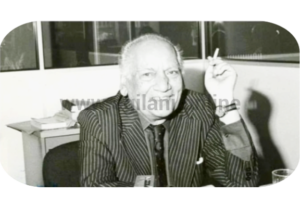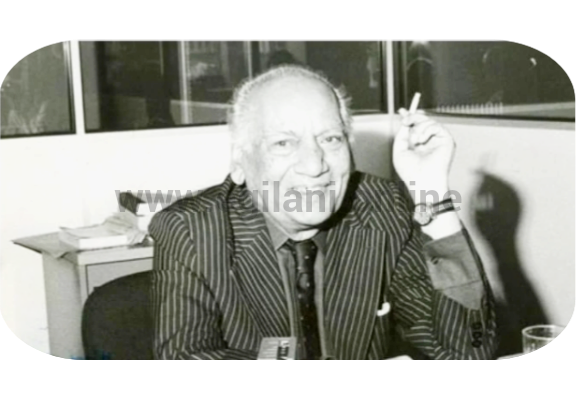Faiz and the Conspiracy of Foreign Elements
The accused described this incident as a conspiracy of foreign elements, but the state claimed that a political party, in collaboration with several military officers, had planned to overthrow the government. This is still regarded in Pakistan as the first attempt at a military coup, with its initial investigation conducted by the army chief. An interesting aspect of this case was that the military officers involved were not tried in a military court under the Army Act, but rather in a civilian court. A total of 15 individuals were charged in this case, including 11 military officers and four civilians, among whom was Faiz Ahmed Faiz, the editor of the English newspaper Pakistan Times. This case is known as the Rawalpindi conspiracy case. The background and implications of this case are very significant for students of Pakistani politics.
 |
Faiz and the Conspiracy of Foreign Elements
General Ayub Khan and Defense Secretary Iskander Mirza, who had personally investigated this conspiracy, later imposed Pakistan’s first martial law together. The attorney who defended the accused in the court docket, Hussain Shaheed Suhrawardy, ultimately became the Prime Minister of Pakistan. Later, at the orders of the well-known Ayub Khan, a treason case was filed against him, but it was never demonstrated in the courtroom. The Prime Minister, whose government was allegedly targeted in this conspiracy, was Liaquat Ali Khan. On March 9, 1951, he revealed the conspiracy himself.
The central figure in this conspiracy was Major General Akbar Khan, the Chief of General Staff of the Pakistani army. The evidence presented during the trial suggested that the conspiracy’s aim was not to assassinate Liaquat Ali Khan, but merely to remove him from power. General Ayub Khan, the army chief, was also to be removed from his position, and the country was to be run through a military council. According to the law, the military officers involved in the conspiracy should have been court-martialed, but instead of trying the military conspirators in a military court, Prime Minister Liaquat Ali Khan got a new law passed by the Constituent Assembly, which became the Rawalpindi Conspiracy Special Tribunal Act of 1951.
When the draft of this law was presented in the assembly, the opposition objected, arguing that the Constituent Assembly was not the legislature and could not pass such a law. However, the government used its majority to get the law passed, under which the trial proceedings were to be conducted by three judges from the higher judiciary.
The question arose: why were the military coup conspirators not being tried in a military court? Prime Minister Liaquat Ali Khan had no satisfactory answer, but the general perception was that the sentences given by this tribunal, passed by the Constituent Assembly, could not be challenged in any other court. The government believed that the accused would be sentenced to death, and to ensure this, religious scholars issued fatwas in favor of the death penalty, and several newspapers published editorials supporting the execution.
Prime Minister Liaquat Ali Khan
While the trial was ongoing in the special tribunal, Prime Minister Liaquat Ali Khan was assassinated during a public gathering in Rawalpindi.
They testified in the tribunal that Major General Akbar Khan, along with his associates, had conspired to overthrow the government, and that the Secretary-General of the Communist Party of Pakistan, Syed Sajad Zahir, and journalist-poet Faiz Ahmed Faiz were also involved. Despite the testimony of these witnesses, none of the accused were sentenced to death or life imprisonment. Instead, they were given prison sentences of four years. When the Constituent Assembly was dissolved, the accused filed petitions in the courts, arguing that the assembly that had constituted the tribunal no longer existed, and as a result, they were granted bail. Two of the accused, Colonel Hassan Khan and Captain Zafarullah Poshni, wrote books about their imprisonment and declared the case to be false.
The Motivations behind the Conspiracy
Primary standard Akbar Khan, the principal architect of the plot, turned into an embellished struggle hero from the primary Kashmir warfare (1947-forty-eight). However, he became disenchanted with the authorities’ handling of the Kashmir trouble and believed that the political management was ineffective. His frustration grew, and he started searching for help from other military officials, leftist intellectuals, and politicians who shared his vision for stronger and greater decisive authorities.
His plan involved removing the sitting top Minister, Liaquat Ali Khan, and changing the government with a military council. not like later coups in Pakistan’s history, this became now not an try at outright dictatorship. as an alternative, Akbar Khan and his co-conspirators expected a government that would be dominated by the military but additionally include civilian elements, in particular left-leaning figures together with Faiz Ahmed Faiz, who turned into the editor of Pakistan times and a outstanding highbrow.
The Trial and Political Maneuvering
The manner in wherein the accused have been tried raises large questions. Commonly, navy employees worried of conspiring against the kingdom are tried with the aid of a court-martial, as the navy has its system of justice for dealing with internal matters. But, Prime Minister Liaquat Ali Khan was driven via a special tribunal law within the Constituent Assembly to try the accused in a civilian court.
This decision became controversial for several reasons:
warding off navy court complaints – A court-martial would have been an inner navy court number, with leniency closer to the accused. Liaquat Ali Khan may also have desired to avoid this to make certain that the full details of the conspiracy had been made public.
making sure a Harsh Verdict – The authorities possibly believed that a military courtroom wouldn’t supply severe punishments. By passing the tribunal regulation, the civilian government ensured control over the criminal lawsuits.
Political method – by handling the trial through a civilian technique, the government may want to use the case to strengthen its role towards critics and competition forces.
But, despite these efforts, the accused did not get hold of the death penalty. This has become in large part due to the lack of concrete evidence, and the opportunity that the government’s case has now become less robust than first claimed. In place of execution, the primary accused have been given prison sentences ranging from four to 12 years.
The Assassination of Liaquat Ali Khan and its effect
Whilst the trial turned into an ongoing one, Liaquat Ali Khan was assassinated on October 16, 1951, in the course of a public gathering in Rawalpindi. His loss of life remains one of Pakistan’s largest political mysteries, with several theories about who was behind the assassination. Some trust it became connected to the Rawalpindi Conspiracy, while others argue that it was a wholly separate count, possibly associated with internal rivalries or foreign have an effect on.
Following Liaquat Ali Khan’s loss of life, political instability grew. Governor-General Ghulam Muhammad dissolved the Constituent Assembly in 1954, creating a constitutional disaster. This dissolution further weakened the civilian government’s authority and allowed the army have an effect on to grow, putting the level of the primary formal martial law in 1958 below fashionable Ayub Khan.
The Aftermath and Legacy of the Conspiracy
One of the maximum striking outcomes of the case was that a number of the accused later performed influential roles in Pakistan’s history. Faiz Ahmed Faiz, for instance, became one of Pakistan’s finest poets, and his imprisonment contributed to his recognition as a progressive intellectual. The involvement of leftist figures, together with Syed Sajjad Zaheer, additionally highlighted the ideological battle between socialism and army conservatism in Pakistan’s early years.
The case also exposed the developing political targets within the army. Though the coup attempt failed, it changed into a precursor to future army interventions in Pakistani politics. The truth that Ayub Khan, who turned into no longer at once worried inside the conspiracy, later became Pakistan’s first navy ruler is an indication that the military have an impact on changed into already begun to grow.
Moreover, the trial set a vital precedent concerning the role of the judiciary in political cases. The authorities try to ensure a particular final result via the usage of a unique tribunal, rather than a navy court validates how legal frameworks will be manipulated for political purposes.
The Rawalpindi Conspiracy became a full-scale early test of Pakistan’s political and judicial structures. Whilst it failed as a coup attempt, it revealed the deep dissatisfaction inside the military and intellectual circles concerning the USA’s governance. The dealing with of the case—via a special tribunal rather than a navy courtroom—also highlighted the political maneuvering that regularly accompanies high-profile trials.
Ultimately, the event of 1951 foreshadowed the growing involvement of the military in Pakistan’s politics. The failure to establish a sturdy civilian authority after the conspiracy case and the assassination of Liaquat Ali Khan most effectively extended the decline of democratic institutions. The instructions from this episode continue to be relevant, as Pakistan has due to the fact skilled multiple army takeovers, every justified via claims of civilian incompetence, just like the grievances that at first motivated Major fashionable Akbar Khan and his co-conspirators.
Zafarullah Poshni, in his English book Prison Interlude, wrote that during a gathering of friends on the night of February 23, 1951, a suggestion to revolt against the government was indeed raised, but Faiz Ahmed Faiz and Sajad Zahir opposed this undemocratic action, after which Major General Akbar Khan rejected the proposal. Faiz himself, in an interview, revealed that he had once served in the army, and many military officers were his friends. These officers themselves prepared a plan, but later rejected it. The government, however, was upset with these officers because they were critics of the Kashmir policy, so the Rawalpindi Conspiracy Case was fabricated to remove them.
That thing, they found very distasteful.”
The history of Pakistan suggests that governments that raise the cry of foreign conspiracies are often themselves part of some conspiracy, and the assemblies that pass laws to convict opponents are often unable to protect themselves.
